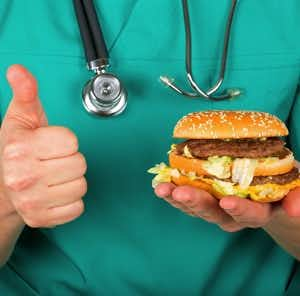
Ask most physicians whether a free lunch from a drug company would affect their prescribing patterns and the chances are pretty good that they would say no. Some would be highly insulted by the very idea that such a trivial gift would influence medical judgment. But a new study published in JAMA Internal Medicine (June 20, 2016) suggests that doctors who get a free lunch from drug company representatives are more likely to prescribe the company’s pricey medications.
What the Data Show:
The investigators reviewed data involving nearly 280,000 physicians during the last five months of 2013. The federal Open Payments Program requires drug companies to disclose payments and gifts to physicians. By the way, you can find out whether (and how much) your doctor is receiving gifts from industry at this OpenPaymentsData link.
The analysis covered Medicare prescriptions in four drug classes: statins, beta blocker heart medicines, ACE and ARB blood pressure pills and SSRI-type antidepressants. The authors found that:
“Physicians who received a single meal promoting the drug of interest had higher rates of prescribing rosuvastatin [Crestor] over other statins, nebivolol [Bystolic] over other beta-blockers, olmesartan [Benicar] over other ACE inhibitors and ARBS, and desvenlafaxine [Pristiq] over other SSRIs and SNRIs. Receipt of additional meals and receipt of meals costing more than $20 were associated with higher relative prescribing rates.”
What that means is that the brand name drugs (Crestor, Bystolic, Benicar and Pristiq) were favored after a drug company-sponsored meal of less than $20. If the meal cost more than $20 or if there were more than one meal involved, the brand name medications that were being promoted were even more likely to be prescribed over less costly generic medications.
How Common Are Gifts to Doctors?
A few years ago the New York Times (Jan 16, 2012) noted that “nearly two-thirds [of doctors] accept routine gifts of food, including lunch for staff members and dinner for themselves.” The article also notes that about one fourth of physicians “take cash payments from drug or device makers…”
In some cases the compensation amounted to hundreds of thousands of dollars in exchange for consultations, speaking engagements, and lectures. When so-called thought leaders encouraged their physician colleagues to consider a particular medication, the drug company could track new prescriptions. If they increased, the doctor might be encouraged to accept additional speaking gigs in exchange for more lucrative payments.
Doctors in Denial:
Most health professionals have long insisted that small gifts have no impact on prescribing habits. But the old adage, “there’s no such thing as a free lunch,” is as true today as it was back in the 19th century when bars gave their customers a free lunch in exchange for buying a drink or two. Because the meals were usually loaded with salt, patrons would end up paying for large amounts of beer that more than paid for the “free lunch.”
An article in JAMA Internal Medicine (May 11, 2009) demonstrated that fourth-year medical students:
“exposed to Lipitor [atorvastatin] promotional items had more favorable implicit attitudes about the brand-name drug compared to the control group…”
The new study in JAMA Internal Medicine is the first analysis to show that even small favors may have an impact on practicing physicians who should know better.
Another study in JAMA Internal Medicine (June, 2016) revealed that:
“In the United States, many physicians have financial relationships with pharmaceutical manufacturers. These relationships include the receipt of industry-sponsored meals, subsidies for continuing medical education, fees for consulting and participation on speaking bureaus, grants, and payments for education and training…
“We found an association between industry payments to physicians and the prescribing of brand-name statins, a frequently prescribed class of medications with many low-cost generic options with similar effectiveness. For most patients diagnosed as having hypercholesterolemia, statins are interchangeable.”
The Bottom Line on Free Lunches for Doctors:
Although doctors like to think of themselves as above influence, the data suggest that they are like most humans in that a favor produces positive feelings. Giving someone a gift, even a small one, may influence his decisions. That is why judges, umpires, referees and other individuals who are supposed to be impartial are not allowed to accept gifts.
Shouldn’t doctors be held to the same high standards? We want them to make objective decisions about our health based on what’s best for us, not a drug or device manufacturer. Our well being depends upon totally independent judgment free of industry influence.
Share your own thoughts on the free lunch controversy below in the comment section and please vote on this article at the top of the page.

